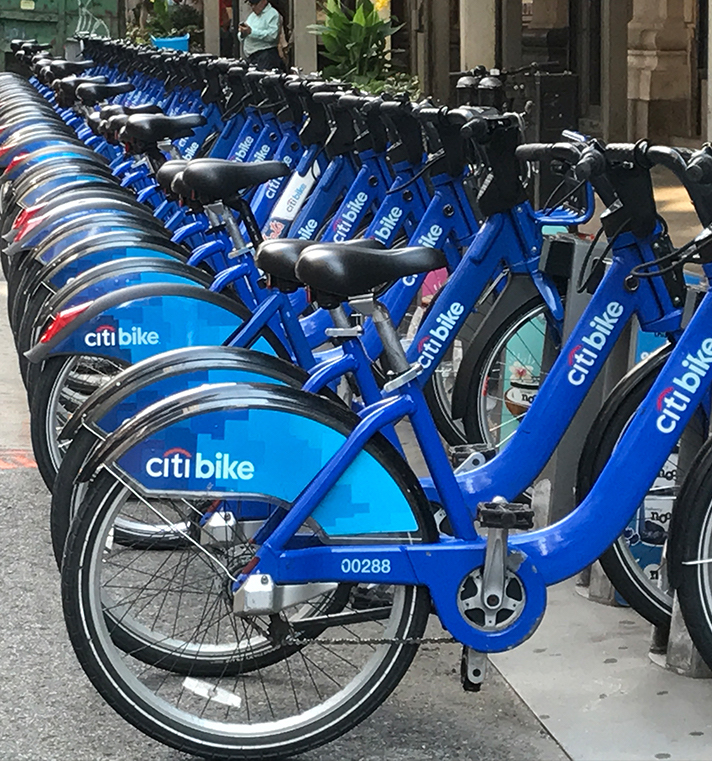New York City has pumped the brakes on life as usual, in an effort to curb the spread of Covid-19. Social distancing, rules against gathering in groups and warnings to stay inside have turned “normal” upside down.
But there is something to look forward to once the outbreak is behind us.
More New Yorkers will have access to the Citi Bike program.
Nearly a year after Citi Bike announced that it is planning to expand further into the outer boroughs, the bike share program is widening its reach. Though the possibility of a city covered end to end by the service seems inevitable, some parts of the Bronx will have to keep waiting.
Its third wave of expansion, which would roll out between 2020-2023, will cover areas of Manhattan, Brooklyn and Queens not covered in its first two waves, and expand into the Bronx for the first time, while leaving Staten Island as the only borough not covered. The $100 million project will triple Citi Bike’s fleet of docked bikes to 40,000, and expand its coverage area to 35 miles.
New York City Council speaker Corey Johnson says he supports even further expansion but estimates that the cost of covering the entire city could be over $300 million – which he describes as “incredibly expensive.”
“It has expanded in a lot of places to communities that aren’t communities of color, or lower income communities. And so we want to make sure that if you’re putting forward a plan, that all New Yorkers can participate in, using bike share in New York City,” Johnson said at a press conference on Thursday, Feb. 27.
Hunts Point is among the areas left out in this expansion. In January, Citi Bike sent a representative to Community Board 2, which includes Hunts Point in its jurisdiction, to announce plans to hold public workshops in the spring to discuss potential expansion into the area in the future. No dates have yet been announced for those workshops, but Hunts Point was not included in the service map listed on Citi Bike’s website.
Maria Torres, the Community Board 2 business committee chairperson, says expanding to the area could help curb car traffic in the area, particularly in parts of the district that are less easy to walk to, like Hunts Point’s industrial area. That, she says, could lead to more businesses hiring locally, instead of looking outside the borough for workers.
“I feel like, if it’s a service, it should be city-wide, not just certain parts. That’s called equity,” said Torres.
“I feel like [Department of Transportation] is trying to push people towards not driving cars, and using public transportation or other healthier options. This would be something I could see the city trying to push to get more vehicles off the road.”
The concern, Johnson says, is cost-effectiveness. Johnson estimates that the cost to cover the entire city would be $300 million, which he describes as “incredibly expensive.”
“I think that part of the fear is part of the city that is less densely populated, and they are more car-centric, you are going to have less use of those Citi Bikes, and that makes it more cost-prohibitive to expand in those neighborhoods because people are going to use those dock stations and bikes less,” said Johnson.
Johnson suggests there could be a way to “incentivize the company to” expand, but says that’s not his field of expertise.
“We’ve gotten some expansion from them, I don’t know how they’re gonna come up with it. They’re going to have to come up with a way to figure that out,” said Johnson.
“At some point there will need to be a conversation about, does the city want to put in a certain amount of money and actually just subsidize the expansion of Citi Bike into neighborhoods that should have it but don’t have it now?”
The district’s council member, Rafael Salamanca, met with representatives from Lyft, which operates Citi Bike, and DOT in August of 2019 to discuss Citi Bike, and has been a vocal proponent of expansion into Hunts Point. Requests for comment were not returned by Salamanca’s office.
Lisa Sorin, president of the Bronx Chamber of Commerce, says that the question of whether to bring Citi Bike to a neighborhood takes on shades of nuance in the borough. Sorin has seen push back from certain neighborhoods, like Arthur Ave., where availability of parking and congestion remain a concern, while she believes Throgs Neck, which is only reachable by bus, would see a benefit.
“Hunts Point, if you ask me, is one of the biggest parts that needs it because they have the fish, meat and fruit markets, and you have all those warehouses. I would imagine you would want it,” said Sorin, who adds that The Peninsula development underway on Spofford Ave. will dramatically increase demand for bike-share services.
“You’re gonna have a lot of people living there with a lot more commercial businesses going up. The fact that they may be left out, to me, is kind of surprising,” said Sorin.
Emails to Citi Bike requesting comment were not responded to.

